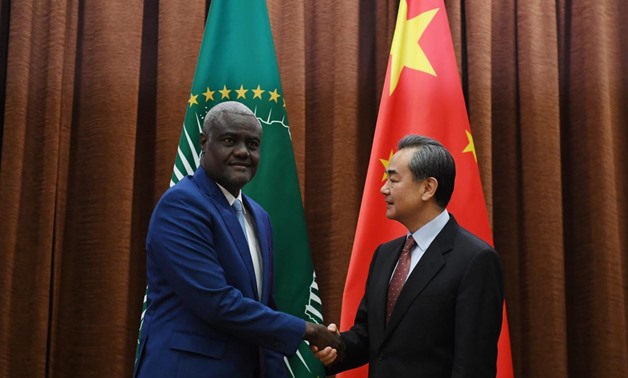
African Union Commission Chairperson Moussa Faki Mahamat (L) shakes hands with Chinese Foreign Minister Wang Yi before a meeting in Beijing, China February 8, 2018. REUTERS/Greg Baker/Pool
CAIRO - 2 September 2018: The third summit of Forum for Africa - China Cooperation, FOCAC, will be held on September 3 and 4 in the Chinese Capital Beijing. The summit attended by Egyptian President Abdel Fatah al-Sisi is themed "China and Africa: Toward an Even Stronger Community with a Shared Future through Win-Win Cooperation."
The inaugural summit took place in 2006 in the same city, while the second convened in 2015 in the South African capital Johannesburg. The upcoming summit will be attended by - in addition to African leaders - Chairperson of the African Union Commission (AUC) Moussa Faki Mohamat, U.N. Secretary-General Antonio Guterres, and 27 international and African groups as observers, according to Xinhua.
The Belt and the Road or the Silk Road initiative will be displayed in line with the UN 2030 Agenda for Sustainable Development, the African Union's Agenda 2063 and individual countries' development plans.
Egypt, which ranks third in terms of trade size with China on the African scale, is crucial to the project as its seaports constitute part of the Silk Road.
Trade exchange between China and Africa reached $170 billion in the form of Chinese exports in the value of $90 billion and African exports worth $80 billion.
FOCAC started as a ministerial meeting called for by China in 2000. The event was attended by 500 Chinese and 45 African personnel, according to the State Information Service (SIS).
The outcome was signing Beijing Declaration of the Forum on China-Africa Cooperation by African and Chinese ministers of foreign affairs, foreign trade and international co-operation, and economic affairs.
The ministers also signed the Programme for China-Africa Cooperation in Economic and Social Development, focusing on intergovernmental cooperation in trade and investment, cooperation in engineering and other infrastructural projects, financial co-operation, debt relief and cancellation by China ,tourism, facilitating work permits, agricultural co-operation, exploration and utilization of natural resources and energy, scientific, technological and cultural Co-operation, supporting the upgrading of Africa's indigenous technologies, co-operation in medical care public health, education and human resources development, environmental management and bio-diversity, trilateral co-operation (Sino-African relations), co-operation on arms Control, multilateral co-operation (cooperation with international organizations and other developing countries).
The second ministerial meeting was held in 2006 before the summit whereas China announced joint mega-projects with Africa, aids to the continent as well as investments in its countries.
In 2009, the third meeting took place in Egypt’s Sharm El Sheikh whereas the ministers adopted the Declaration of Sharm el-Sheikh and Sharm el-Sheikh Action Plan (2010-2012), covering agriculture, environmental protection, investment promotion, debt exemption, market access expansion, addressing climate change, scientific and technological cooperation, health care, education, cultural exchanges and other areas.
In 2011, the fourth ministerial meeting convened in the Ethiopian capital Addis Ababa, resulting in China forming a follow-up committee encompassing high-ranking officials from 21 ministries, agencies, and commissions.
The fifth ministers convention was held a year later in the Chinese capital. China promised providing aids worth $20 billion for Africa, especially in the sectors of infrastructure, agriculture, and industry. Also, a partnership initiative for peace and security was signed.
The South African capital hosted for the second time the latest ministerial meeting in which China declared 10 main cooperation plans to strengthen manufacturing, and modernize agriculture, allocating $60 billion as aids to achieve them.


Comments
Leave a Comment